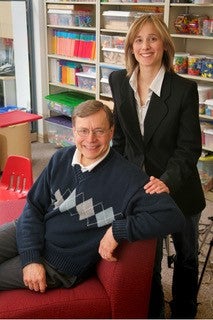Finding Math in Childhood
Small children, early learning, big implications
This Engaging Idea explores how very young children relate to math and the importance of early math knowledge to later success in school.
Biography

Dr. Douglas Clements, Kennedy Endowed Chair in Early Childhood Learning and Professor at the University of Denver, is widely regarded as a major scholar in the field of early childhood mathematics education, one with equal relevance to the academy, to the classroom, and to the educational policy arena. At the national level, his contributions have led to the development of new mathematics curricula, teaching approaches, teacher training initiatives, and models of "scaling up" interventions, as well as having a tremendous impact on educational planning and policy, particularly in the area of mathematical literacy and access. He has served on the U.S. President's National Mathematics Advisory Panel, the Common Core State Standards committee of the National Governor's Association and the Council of Chief State School Officers, the National Research Council's Committee on Early Mathematics, the National Council of Teachers of Mathematics national curriculum and Principles and Standards committees, and is co-author each of their reports. A prolific and widely cited scholar, he has earned external grant support totaling over $20 million, including major grants from the National Science Foundation, the National Institutes of Health, and the Institute of Education Sciences of the U.S. Department of Education.
Julie Sarama is the Kennedy Endowed Chair in Innovative Learning Technologies and Professor at the University of Denver. She conducts research on young children's development of mathematical concepts and competencies, implementation and scale-up of educational reform, professional development models and their influence on student learning, and implementation and effects of software environments (including those she has created) in mathematics classrooms. These studies have been published in more than 77 refereed articles, 6 books, 55 chapters, and over 80 additional publications. Dr. Sarama has directed over 24 projects funded by the National Science Foundation (NSF), the U.S. Department of Education's Institute of Education Sciences (IES) and the National Institute of Health (NIH). She is Principal Investigator on her latest NSF award, entitled, "Early Childhood Education in the Context of Mathematics, Science, and Literacy." She is co-directing three large-scale studies funded by the U.S. Education Department's Institute of Educational Studies (IES): 1. Scaling Up TRIAD: Teaching Early Mathematics for Understanding with Trajectories and Technologies; 2. A longitudinal extension of that work, entitled, Longitudinal Study of a Successful Scaling Up Project: Extending TRIAD; 3. with Dr. Sarama as Principal Investigator, is an efficacy study, Increasing the efficacy of an early mathematics curriculum with scaffolding designed to promote self-regulation. Another recent project, just funded by the Heising-Simons Foundation and the Gates Foundation, Scalable Professional Development in Early Mathematics: The Learning and Teaching with Learning Trajectories Tool, is updating and disseminating a professional development software application empirically supported in previous projects.
More on the Subject
- Math in the Early Years - A Strong Predictor for Later School Success
- Learning and Teaching with Learning Trajectories (LT2)
- Children's Measurement Project
Questions for personal reflection or group discussion
- Why do math? Does it take away from more important goals for young children?
- What do children know about math? What can they learn?
- What gaps threaten some children's success?
- What does research suggest is core math education for young children?
- How can we connect children's informal to their school math?
- What are learning trajectories and what role should they play in standards, curriculum, and teaching?
We want to hear from you! We appreciate your comments and your perspective about the ideas video. Please click on the button below to submit your comments.